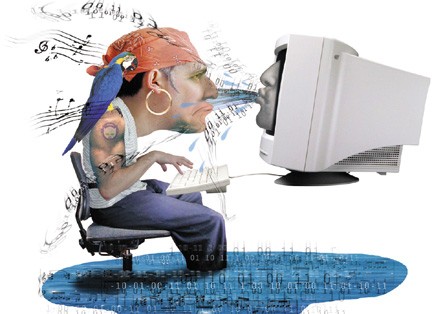
File-sharing service banned on campus networks
After checking his mailbox, Clark Castle, a sophomore advertising major, tore open a letter from the Information Technology Services Department and quickly discarded it on his way out of Hughes-Trigg. Like most of his peers he ignored the letter, which warned students about using file-sharing software applications to download music or movies that may be copyright protected.
“I didn’t really give the letter much thought,” said Castle. “It seemed just like another letter warning us about consequences that would never really be put in effect.”
That night as Castle sat at his computer, he opened up the LimeWire program, which he had regularly used while at SMU, and began downloading new songs. After downloading a few songs he shut down his computer for the night.
“The next morning, I tried connecting to the Internet and it wouldn’t let me,” said Castle. “I thought at first that the server was just down until I tried logging on to a friends computer and could check my e-mail.”
An e-mail from Information Technology Services told Castle that the network had detected illegal use of file sharing software and that his network connection had been disabled. To regain access to his connection he would have to either show proof that he had been given authorization to download copyrighted material or confirm in writing that he had deleted the program from his computer.
“I immediately deleted the program from my computer and wrote a letter and took it up to the center,” said Castle. “When I got up there, I didn’t even need to turn in my letter because there were already forms to fill out regarding the violation.”
Until classes resumed for the Spring 2003 semester, users on the SMU server were able to download copyrighted computer games, movies and material from programs like LimeWire and Kazaa Media Desktop without any consequences. Starting this semester, students will no longer be able to download these commonly used file sharing programs.
“I came back this semester with a new computer and the server wouldn’t even let me download certain file sharing programs,” first-year student Emily Disque said. “I had to search for a long time until I could find a program that wasn’t blocked by SMU.”
According to an email from George F. Chrisman, associate vice president of Information Technology Services, using the SMU server to download copyrighted files is a violation of the U.S. Copyright Law. All students who are using the SMU server received a letter over winter break regarding the consequences of using these programs. If use of one of these programs is detected, the user will receive one warning to remove the program from their computer. If the user continues to participate in file sharing, his case can be taken to the Student Judicial Affairs and SMU Legal Affairs.
For Castle, the warning was enough.
“For about 48 hours I couldn’t connect to the Internet, but they started it back up after I filled out the forms,” said Castle. “I don’t want to risk suspension or any legal actions, so I’m just not going to download anything anymore. I guess they’ve finally decided to back up what they’ve always been saying with consequences.”









